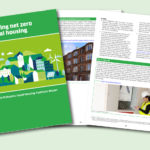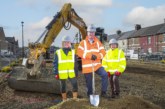A new report, published ahead of the COP26 climate change conference in Glasgow, calls on social landlords across Scotland to work together with the Scottish Government to achieve net zero carbon emissions.
Achieving Net Zero in Social Housing is published by the Zero Emissions Social Housing Taskforce (ZEST), which was co-chaired by Sally Thomas, CEO, Scottish Federation of Housing Associations and Aubrey Fawcett, Chief Executive of Inverclyde Council and SOLACE.
The group was tasked with examining and making recommendations on what is required of the social housing sector to maximise its contribution to the Scottish Government’s climate change targets. By 2045, over two million homes will need to transition from fossil fuel-based systems to low and zero-emissions systems such as heat pumps, heat networks and other technologies. Social landlords will help the Scottish Government to achieve these ambitious targets. With over a third a third of social housing tenants living in fuel poverty, it’s critical that achieving net zero emissions in social housing doesn’t exacerbate this; no tenant should be left with costs they can’t afford or heating systems that don’t work for them.
The report makes overarching recommendations, with supporting actions, about how social landlords, local authorities and the Scottish Government can work together in partnership to address the dual challenge of achieving net zero emissions in social housing while keeping energy bills affordable and reducing fuel poverty. This will require a ‘fabric first’ approach and a clear commitment to a just transition.
Sally Thomas, SFHA Chief Executive and Co-chair of ZEST, said: “Tackling climate change is one of the most pressing global issues, and social landlords have a key role to play by helping the Scottish Government to achieve its ambitious targets for improving homes. However, the challenge is ensuring that we can deliver a fair and just transition to zero-emissions homes that allows our sector to continue to reduce fuel poverty and keep rents affordable.
“Social landlords can work together with government to attract investment, create jobs in the green economy, and improve the warmth and comfort of homes to tackle both climate change and fuel poverty together. Achieving this will also require sufficient investment in order to realise the opportunities and ensure the costs and risks don’t fall disproportionately on social housing providers, their tenants and communities.
“Social landlords are ready to work with the Scottish Government, and other partners, to deliver this report’s actions, deliver a fair and just transition to net zero and play our part in tackling the climate emergency.”
Aubrey Fawcett, Chief Executive of Inverclyde Council and SOLACE representative on the group commented: “Heat from buildings accounts for around 20% of Scotland’s greenhouse gases and social housing has a large part to play in achieving net zero. The Scottish Government’s climate change targets are ambitious and to match that the investment and support for social landlords needs to be just as ambitious.
“There are many examples of sector leading good practice across the country from social landlords to build on. Over half of Scotland’s social landlords housing stock already achieves a good level of energy efficiency compared with two fifths in the private rented and owner occupied, so they are starting at a good base. Working together across the sector and with national and local government, accessing proper investment that protects tenants from large rent increases and ensuring tenants have a meaningful say in developments will be crucial to getting to net zero across the sector.”
Net Zero Secretary Michael Matheson said: “The Scottish Government is wholly committed to ending our contribution to climate change by 2045, and to doing so in a way that is fair for everyone and leaves no-one behind.
“As work to decarbonise Scotland’s social housing accelerates, it is important that we take a localised approach and ensure that through each stage — from planning to design and delivery — the distinct needs of local communities are considered.
“I am grateful to the taskforce for this report, which we will consider carefully as we continue to engage with and work alongside local authorities, and with social housing providers and their tenants to ensure a just transition to net zero.”
The recommendations call for:
- social landlords and the Scottish Government to agree how to deliver net zero emissions homes in a fair and just way, including developing clear metrics to measure progress and a programme to address the four drivers of fuel poverty.
- social landlords and national and local government to ensure that tenants have a say and are supported in the journey to achieving net zero emissions in social housing, including in decisions, design, and delivery.
- the Scottish Government to ensure there is adequate investment for the social housing sector to achieve net zero emissions while keeping rents affordable for tenants — this will involve developing a sector capacity assessment to determine the net cost increase of the transition above the current investment cost profile.
- the Scottish Government and social landlords to prioritise investment and solutions which reduce heating demand and improve the condition of Scotland’s housing stock as a crucial first step in readying homes for zero-emissions heat and minimising fuel costs.
- for all partners involved in the transition to net zero to work collaboratively to develop technical solutions and ensure there are enough skilled workers to deliver these to a high standard. This would involve the creation of an ongoing housing net-zero technical steering group to advise on emerging challenges, solutions and strategies.
The task force report has highlighted that the recommendations in the report are not an end point. Instead, they are intended to provide the next steps as to how the social housing sector, in partnership with local and national government, the private and third sectors, wider civic society and tenants can work together.
The full report, Achieving Net Zero in Social Housing, is available on the Scottish Government website at https://www.gov.scot/publications/achieving-net-zero-social-housing-zero-emissions-social-housing-taskforce-report/documents/









